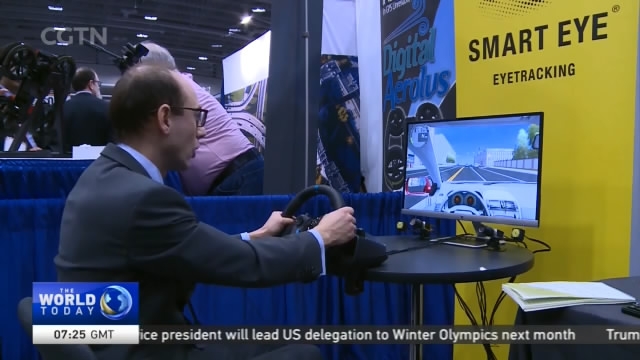
18:38, 11-Jan-2018
Easing Congestion: Transportation experts explore new tech in US

The world's leading transportation experts are gathering in the US capital to discuss how cutting-edge technology can address the growing pressures of traffic congestion and sustainability. They are combining big-data, artificial intelligence and automated vehicles to address the many challenges we now face. CGTN's Daniel Ryntjes reports.
How do you see your city from the street from a car from the train from the air? This Canadian company, Inro, sees a digital ecosystem. The streaks of light represent you and me struggling to get from point A to point B. They have travelled to the Transportation Research Board Conference in Washington, D.C. Experts from Chang'an University are discussing smart transportation systems using big data and artificial intelligence.
ZHAO XIANGMO, VICE PRESIDENT CHANG'AN UNIVERSITY "Our cars are intelligent and our roads can be intelligent, so people can adjust to this. So basically, the entire web is going to be intelligent."
DANIEL RYNTJES WASHINGTON "As I'm driving down these virtual streets, somewhat chaotically, there are sensors that are monitoring not only the head movements that I'm making, but also my eye movements, where I'm gazing, and even the pupils and whether the pupils are dilated. And this technology is being used currently in some premium German car models, as well as some self-driving technology."
Einride is aiming to put a fleet of driverless trucks on the streets of Sweden later this year. They can be sent out when traffic is light.
ROBERT FALCK, CEO EINRIDE "That's the thing, there is no windscreen. The thing is this t-pod is designed completely for self-driving. There's no cab, no diesel engine, no gearbox. It's all electric, electric engines, batteries and self-driving technologies."
But given the pressures of urban congestion, no one expects technology will eliminate our daily struggles altogether.
TIM LOMAX TEXAS TRANSPORTATION INSTITUTE "I think really when you see active vibrant alive urban areas there's congestion. The goal is to manage that congestion and you have a system with relatively reliable travel times, even if they are longer than you want them to be."
And the challenge ahead will be figuring out how to most effectively use the big data being collected and to design practical solutions which we, the public, are ready to integrate into our daily lives. Daniel Ryntjes, CGTN, Washington.

SITEMAP
Copyright © 2018 CGTN. Beijing ICP prepared NO.16065310-3
Copyright © 2018 CGTN. Beijing ICP prepared NO.16065310-3